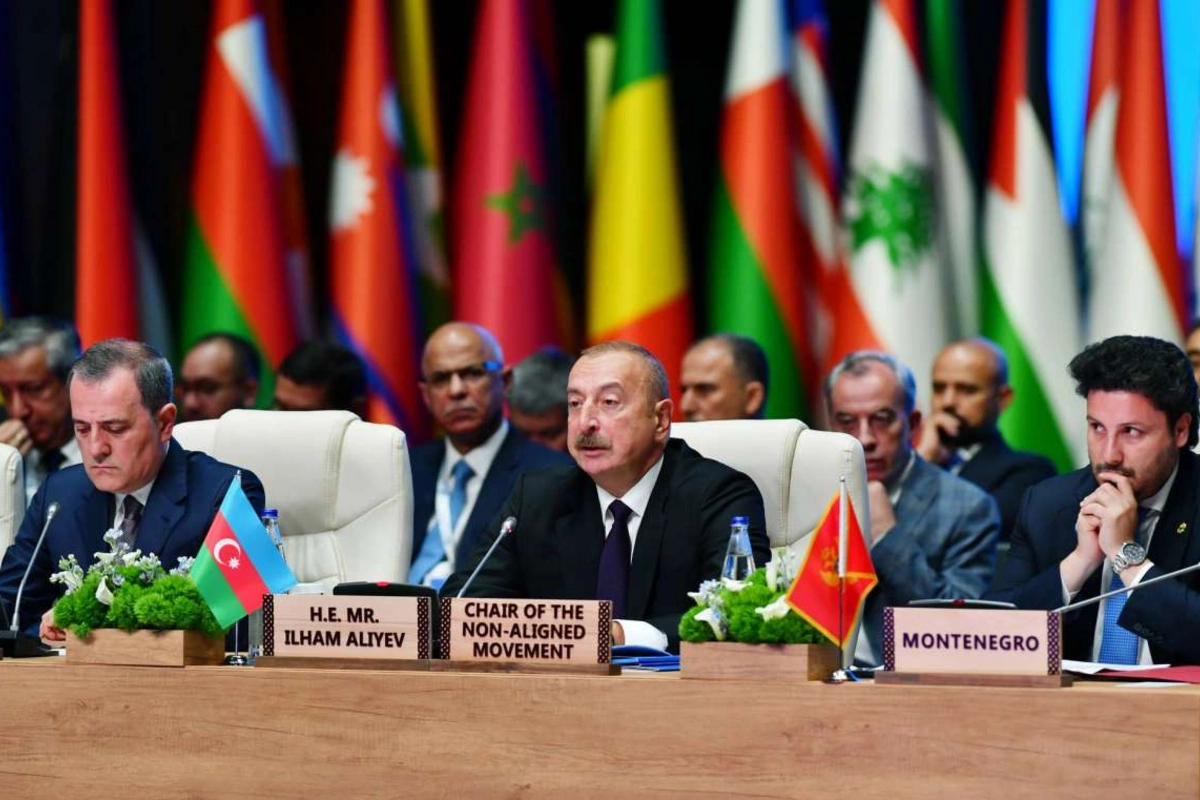
This week Azerbaijan hosted the latest summit meeting of the Non Aligned Movement. President Ilham Aliyev, the organsation’s current chairman welcomed numerous heads of state to Baku but the press focused particularly on his criticisms of French President Emmanuel Macron.
Image: president.az
The Non-Aligned Movement (NAM) is a grouping of 120 nation states which seek “an independent path in world politics” that avoids the necessity for members to become “pawns in the struggles between the major powers.”
The idea of non-alignment started in the 1950s when India and Yugoslavia were vocal in expressing the wish not to take sides in the Korean War—essentially a proxy conflict between NATO and the USSR. The movement was officially founded in 1961 and grew rapidly over the following decade, a period that saw widespread decolonization. Today, a large proportion of member states are those who suffered periods of colonial control.
The apparently unipolar world that appeared to emerge with the collapse of the USSR in 1991 challenged the movement’s raison d’etre. Still, in today’s ever more complex multi-polar geopolitical landscape, the organization once again has the opportunity to be highly relevant as a counterweight to larger powers.
NAM Chairmanship is an honour held on a rotating basis by the head of state of one of the members—currently Azerbaijan. Hence the 2023 NAM Summit was held in Baku and chaired by President Ilham Aliyev, following an earlier summit-level meeting in March this year to discuss the NAM response to the continuing COVID-19 pandemic.
The timing of the NAM summit happened to be shortly after widespread outbreaks of violence in France in reaction to the apparently unprovoked killing of a 17-year-old boy of Algerian origin. Described by the BBC as “fuelled by everyday discrimination,” the French riots could be seen from a NAM perspective as illustrating the continuing colonial attitudes of the ‘old powers.’ So it was perhaps unsurprising that France would be a topical subject for President Aliyev’s NAM speech. Aliyev told his audience that France is “falsely presenting herself as a defender of human rights and international law,” yet “France has even banned the Corsican language and does not accept the concept of ethnic minorities”—a reference to a 10 March 2023 ban on the use of the Corsican language in Corsica’s own assembly.
Aliyev insisted that France “still interferes in domestic affairs of other countries” from its military “neocolonialism policy in Africa” to its attitudes to the South Caucasus, which he described as “Orientalist.” He suggested that it was ironic that Macron’s France was simultaneously “trying to present itself as a defender of the Armenian minority in Azerbaijan.”
This is not the first time that Baku has perceived France, and in particular French President Emmanuel Macron, to have a pro-Armenian bias. Two years ago, Baku was piqued when Macron proved quick to call for Azerbaijani troops to withdraw from disputed border areas. Macron was at the table for optimistic talks in December 2021, but his comments in October 2022[1] left Baku furious. For a period thereafter, Aliyev was only prepared to join EU-brokered talks on the condition that Macron would not be present, which led to the cancellation of talks in December last year.
After some fence-mending, Macron participated in an informal meeting between Aliyev and Armenian PM Nikol Pashinyan on 1 June on the sidelines of the European Political Community summit in Chisinau, Moldova[2]. While that meeting appeared to have proceeded amicably, France’s post-meeting press release was described by an Azerbaijani foreign ministry spokesperson as distorting the position of the parties, though without elaborating on the points of disagreement.
[1] The comments referring to the 2020 2nd Karabakh War were that Azerbaijan had “launched a terrible war, with many deaths, (and) atrocious scenes.” However, from the Azerbaijani viewpoint, the war had a fully justified last resort to reclaim occupied land after all diplomatic efforts had failed.
[2] along with German Chancellor Olaf Scholz and European Council President Charles Michel
Share on social media